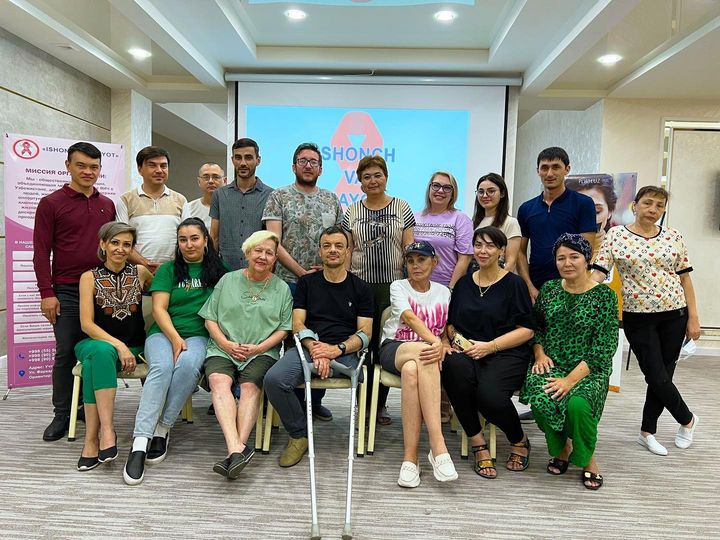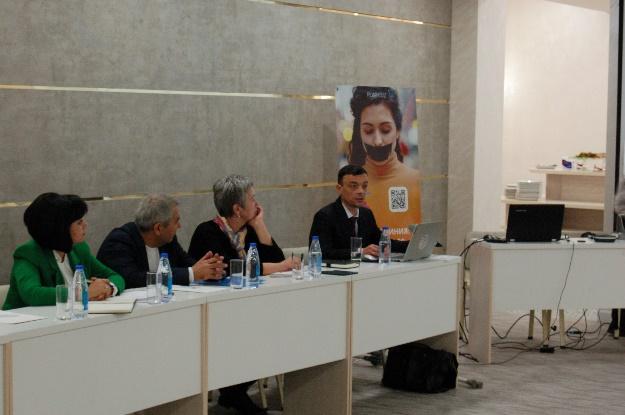On December 23, in Tashkent, the Republican non-governmental non-profit organization “ISHONCH VA HAYOT” organized an event aimed at the dialogue of civil society and government agencies on solutions to reduce barriers related to human rights violations among people living with HIV and vulnerable groups with increased risk for HIV infection.
On the part of departmental structures, representatives of the Republican AIDS Center, the Ministry of Health of the Republic of Uzbekistan, the Secretariat of the CCM, the Ministry of Internal Affairs of the Republic of Uzbekistan, the Ombudsman, the Ministry of Employment and Labor Relations of the Republic of Uzbekistan, the International Organization for Migration (IOM) in Uzbekistan, USAID, UNAIDS, as well as Civil Society Organizations and representatives of the PLHIV and KP community.
Particular attention at the round table was focused on the presentation of the work of “ISHONCH VA HAYOT” on documenting cases of human rights violations and responding to them, within the framework of the project “Reducing barriers related to human rights violations among people living with HIV and vulnerable groups of the population with increased risk of HIV infection and increased remote legal support for women who have been subjected to violence” (REAct).
“The collected data is not for accusations. We are only stating the fact that, alas, there are violations and we need to look for ways to solve them together to avoid such problems in the future.” – says Sergey Uchaev, Chairman of the Board of “ISHONCH VA HAYOT”. “I am sincerely glad that our research within the framework of the REAct tool has caused an adequate response from participants from government agencies – after all, the vast majority of violations are recorded precisely from their representatives. There was no denial, on the contrary, the understanding that there are gaps in these issues since not everyone has an understanding of how to work with key groups. For example, the Ministry of Internal Affairs of Uzbekistan has only recently created a department for working with the community of PLHIV – there are new employees, and they have a great interest both in prevention programs and in the field of patients’ rights. But knowledge is still lacking. Therefore, we agreed that for further, successful work, a constructive dialogue between civil society and government agencies is necessary. And for our part, we will support him in every possible way.”
As a summing up of the round table, the participants adopted the key conclusions and recommendations based on the results of the annual report within the framework of the project “Reducing barriers related to the violation of human rights among people living with HIV and vulnerable groups of the population with an increased risk of HIV infection and increasing remote legal Support among Women Subjected to Violence” (REAct) to change the situation with the rights of key populations in Uzbekistan:
– Bring the norms of criminal legislation in line with the requirements of international human rights treaties. In particular, to consider the issue of the complete abolition of Art. 113 of the Criminal Code of the Republic of Uzbekistan.
– Bring the norms of criminal legislation in line with the requirements of international treaties on combating drug trafficking. In particular, consider creating an effective system of alternatives to punishment for crimes not related to the commercial sale of drugs, including the creation of a system for voluntary referral of people who use drugs to treatment and prevention services. To give clarifications to the Supreme Court of the Republic of Uzbekistan on the restrictive application of penalties to people who have committed acts not related to commercial sales.
– Consider the question of the complete abolition of Art. 190 of the Code of Administrative Offenses of the Republic of Uzbekistan (engagement in prostitution) and on the limited application of the norms of the Criminal Code relating to sex work (Articles 130, 131 of the Criminal Code of the Republic of Uzbekistan) only to cases of exploitation of prostitution and guided by the principle of non-punishment of the victim.
– Conduct mandatory information events with the participation of civil society organizations for employees of government agencies and medical institutions that interact with PLWH and representatives of other CGs, to constantly inform on issues about HIV infection, including clarification of points of scientific consensus regarding the possibility of transmission of HIV infection in those or other circumstances (use of a condom, ART, etc.), as well as clarification of the provisions of the Criminal Code of the Republic of Uzbekistan regarding the form of intent for crimes that are considered completed from the moment the acts were committed, regardless of the onset of consequences (Article 21 of the Criminal Code of the Republic of Uzbekistan), and the provisions Criminal Code of the Republic of Uzbekistan on the public danger of an act (Article 14 of the Criminal Code of the Republic of Uzbekistan).
– Conduct consultations with health authorities to ensure that registration does not affect the ability to receive health care services citizens. – Conduct regular information and training activities with police officers, lawyers, and judges on the work within the framework of the implementation of the Palermo Protocol including the need to follow a rights-based human principle is not punishment of the victim, which primarily includes the creation of conditions for the protection of the rights and exclusion of punishment for sex workers to effectively combat human trafficking, based on the recommendations of the United Nations Coordinating Group on Combating Trafficking in Persons.
Recall, as of the end of 2022, 13 REActors of Uzbekistan recorded 797 complaints about violation of the rights of representatives of key groups since the start of the pilot project in 2020.
Also read:
Regional meeting: Sustainability of the response to HIV in Albania, Bosnia and Herzegovina, Montenegro, North Macedonia and Serbia. Experience of Moldova in the implementation of REAct system
Community-based monitoring in action: how REAct helps to detect human rights violations and solve systemic gaps in the provision of health services



















